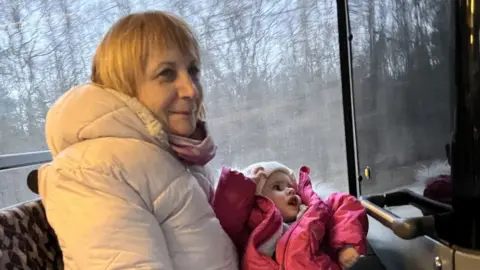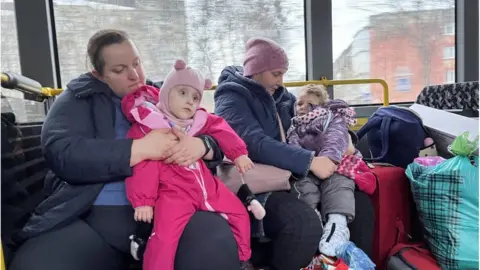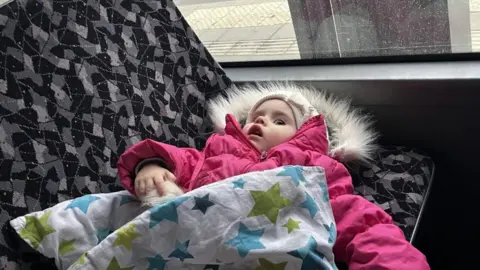Chaos, upheaval and exhaustion for Ukraine's disabled children
 BBC
BBCThey had been travelling for thirty hours already. There were many hours ahead. The bus to the Polish border was a capsule of exhaustion, grief and tender mercies. Carers hugged the frightened children and whispered soothing sounds. It was not a time or place for words. There were none that could have explained the madness engulfing the world of the children from Kharkiv's Hippocrates Care Centre. They were aged between one and three and all were disabled, with serious medical conditions.
Before the bus there had been the train across the land from east to west, and before the train a journey in cars through stricken Kharkiv. Shells were falling close by and the noise sparked terror in the children. The dash to the station was their first trip outside of a bomb shelter since the Russian invasion began.
The city of Kharkiv is only 54 kilometres from the Russian border and was one of the first places targeted in the invasion. Hundreds of thousands of its residents have since fled for neighbouring countries, the majority to Poland. One of the young carers on the bus, Iryna Miroshnichenko, said that when the bombardment began staff had to make an urgent decision: hide in the basement shelter of the centre or to try to leave immediately. Either way they ran the risk of death or serious injury.
It was an agonising dilemma for people who had never known war and for whom the care of the children is something like a sacred responsibility. It can be seen in the gentleness with which they treat their young charges.

"It's very deplorable. It is really, really bad. We are being bombed from morning till night. We've been in the bomb shelter all this time. We were there with all of the kids, all of them hiding," said Iryna.
The director of the centre, Valentyna Shlyahova, went back and forth through the crowded bus reassuring children and encouraging her staff. She has a disabled daughter who has already been evacuated to safety. Another older daughter and her family have also left Kharkiv. They are all among the 1.5 million people forced out of their homes by President Putin's decision to invade Ukraine.
Valentyna gestured towards a pair of children who were crying relentlessly.
"We are tired ourselves and the children are tired. You hear how the children behave? They also want calm, silence, cosiness and warmth," she said.
Unicef estimates that 7.5 million children in Ukraine are in danger from the conflict and require urgent assistance. Shelling has hit hospitals, restricted the work of emergency services and is creating a major wave of trauma among the young. Half a million children have fled out of Ukraine with their families.
A week ago, Unicef's executive director, Catherine Russell, called for respect for the laws of war to protect children.
"We renew our call on all parties to protect civilians and civilian infrastructure - and to abide by all legal and moral obligations to keep children out of the line of fire. We must protect all children in Ukraine. Now. They need peace," she said.
In the week since she made that statement Russia has escalated the conflict.
To those of us witnessing the exodus of refugees the most striking feature is the huge numbers of children of all ages who are on the move. Most are travelling with their mothers. All men of fighting age are being ordered to stay behind unless they have a medical or job exemption. The demands of the war supersede those of families.

One of the most powerful images of this conflict is that of mothers and carers patiently shepherding children through the chaos that has ruptured family lives. It is an inspiring counterpoint to the obscenity of this war.
I asked director Valentyna Shlyahova what the children meant to her. She smiled. "Many people ask me why I do it. I would say that twenty years ago fate took a turn and I took this job. Let me say to you that I feel that I am needed here."
Valentyna has no idea when she or the children will be able to return to Ukraine or what kind of country they will find when that moment comes. But she will be with them, whatever lies ahead.
